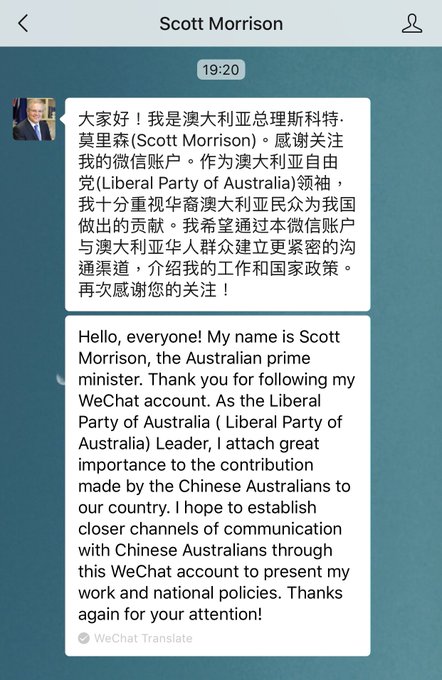Chinese media mocks Australia and Prime Minister in WeChat posts
May 8, 2019
 PHOTO: Prime Minister Scott Morrison opened up a WeChat account earlier this year. (AAP: Ellen Smith)
PHOTO: Prime Minister Scott Morrison opened up a WeChat account earlier this year. (AAP: Ellen Smith)
Prime Minister Scott Morrison and the Coalition Government have been targeted by online propaganda coming from social media accounts affiliated with the Chinese Communist Party (CCP).
Key points:
- Propaganda researchers found that there was a clear "anti-Liberal story" coming from social media accounts, many which have close affiliations to the Chinese Government
- The posts criticise Australia's involvement in the Five Eyes alliance
- The researchers say there is little evidence of attacks on Bill Shorten and the Labor Party across their dataset, although this is happening elsewhere on WeChat
The findings come from a paper, prepared by cyber propaganda researchers Dr Michael Jensen, Dr Titus Chen and Tom Sear, which will be delivered to the Safeguarding Australia Summit in Canberra today.
"Our evidence suggests that accounts aligned more closely with the Government in Beijing have a clear anti-Liberal (Government) story coming out of them," said Dr Jensen, a senior research fellow at the University of Canberra's Institute for Governance and Policy Analysis.
Across a period of five months from November 2018 to March 2019, the researchers analysed the Australian content on 47 of the most visited WeChat Official accounts in mainland China, 29 of which were aligned with the CCP.
In total, 2,057 Australia-related articles published by the accounts were studied.
'Cosying up to China?'

Translation:
- Cosying up to China? This trouble-making country did a huge about-face.
- There is a country whose head has been kicked hard by kangaroos, and now seeks to befriend us.
The three academics said there was a clear bias shown against the Liberal Government.
"The top topic in articles mentioning Australia was the criticism of the Liberal Government and specifically Scott Morrison," Dr Jensen said.
One post from February mocked the Prime Minister for joining WeChat in the lead-up to the election campaign.
"There is a country whose head has been kicked hard by kangaroos, and now seeks to befriend us," a post by commercial media site Tiexue Junshi said.
The site, which is 1.5 per cent owned by Chinese state media, targeted the timing of Mr Morrison's take-up of WeChat.
"On 28 January, Australian media, the Sydney Morning Herald, quoted Australian experts as saying that WeChat used by the Chinese may be exploited by the Chinese Government to interfere in the Australian general election … just after four days, on 1 February, the Australian Prime Minister Morrison unbelievably activated a WeChat official account."
"What the Australian Prime Minister Morrison is doing is nothing more than to win over the support of the Chinese in Australia."
When contacted, Mr Morrison's office said: "We don't have anything to add."
The researchers say there is little evidence of attacks on Bill Shorten and the Labor Party across their dataset.
This may have something to do with the policy decisions relating to China made by the Liberal party in its last term, and that the CCP may not be keen to mention that other countries actually have opposition parties.
The content studied by the researchers is different from the scare campaigns spreading in WeChat closed groups targeting Chinese-Australian voters.
However, it is possible that some of the anti-Liberal Government propaganda generated in China could be shared inside closed groups away from the scrutiny of researchers.
The WeChat data sourced for today's speech was gathered from a five-month period before Mr Morrison called the election and just after the Coalition government under Malcolm Turnbull caused anger in Beijing by banning Huawei from any role in building Australia's 5G network and for introducing laws relating to foreign interference.
Criticism from Global Times
Global Times is a state-run tabloid. In this post they are criticising alleged sexism.
Translation:
- It is just unbelievable that the Australian Prime Minister remarked like that yesterday.
- The Australian Prime Minister's remarks yesterday are probably to offend women all over the world.
- … women should not realise their rights at the expense of men.
Dr Chen, an Associate Professor at the National Sun Yat-Sen University in Taiwan, said a range of criticisms came up in the data.
"The Liberal Government has been criticised harshly for siding with Washington, for joining Five Eyes," he said.
Five Eyes is an intelligence-sharing alliance made up of the United States of America, Australia, Canada, New Zealand and the United Kingdom.
"Canberra has been criticised for the so-called anti-China migrants' policies, especially the rich immigrants that are involved in Australian politics [and] the way the media portrayed the Huang Xiangmo case," Dr Chen said.
"I do not think these WeChat criticisms against the Australian Government are related to the coming elections … it was already there last October or November.
"The criticism targeted the Liberals and the Liberal Government, and its leadership. So, it first targeted Turnbull and then when he stepped down, it targeted Morrison."
Co-author of the paper Tom Sear, who is an Industry Fellow at UNSW Canberra Cyber, said the mentioning of Five Eyes in the WeChat posts could be part of a campaign by China to manipulate public opinion.
"Disintegrating the unity of the Five Eyes is likely to be a strategy of the Chinese Government and Australia is vulnerable because we have an asymmetrical relationship between who is our economic partner and who is our strategic partner," he said.
Mr Sear questions whether WeChat, like Huawei, could soon face greater scrutiny from Australian officials.
"I wouldn't necessarily say that regulation is the answer, but we need to start having this discussion," he said.
"In an era of persistent cyber conflict, democracies like Australia need to think very seriously about how we might collectively as a community work, not only with WeChat, but with all social media."



No comments:
Post a Comment
Comments always welcome!